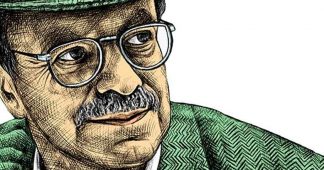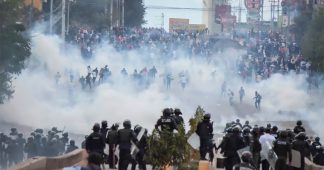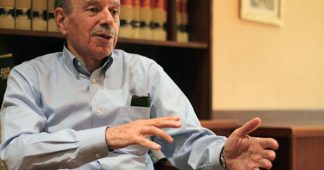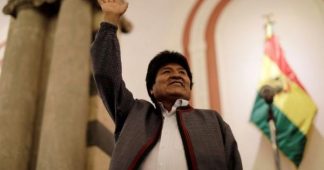The analysis of James Petras in CX36, November 25, 2019
Translated via Google Translate
“We could say that the Broad Front should win, but it had a bad history in recent periods. Do not forget that unemployment has grown – not much but it has grown; wages have been frozen or have fallen; there are many social problems – even such as crime – and the lack of policies against poverty, ”said the American sociologist, Professor James Petras, when analyzing the electoral result of the ballot in Uruguay. He added that “if the Frente Amplio had had a socially advanced program, no big deal but at least to lower unemployment figures, increase wages and protect employment; they would have obtained better results ”. He also analyzed the socio-political situation in Chile, Bolivia and Colombia that have caused many popular demonstrations, while, under different conditions, party leaders agree with the respective governments with their backs to their peoples. He also referred to US domestic policy and said the Trump administration is in a “chaotic situation.” We transcribe this analysis that you can hear again here: https://archive.org/details/elanalisisdejamespetrasencx3625nov19
Hernán Salina: James Petras, good afternoon, we have the opportunity to chat live past noon this Monday, and tomorrow will be listening as usual, the audience of ‘Mornings of Radio’.
A pleasure to receive it.
James Petras: Thank you very much.
With many important news even in Uruguay.
HS: Exactly. In this case we want to start the dialogue with you for our country. First impressions that have left this ballot in the distance where the numbers give first place to Luis Lacalle Pou – leader of the opposition – but there is the expectation of the votes observed, which could give Daniel Martínez a chance – candidate of the Front official Broad- but statistics say that it is impossible for the results to be reversed.
JP: Yes, the polls can always be deceiving and much more because of the fact that some electoral authorities could handle the elections, but I hope there is no trap in the final count.
HS: What can be read of this parity that remains between this block that leads Lacalle and the Frente Amplio?
JP: We could say that the Broad Front should win, but it had a bad history in recent periods. Do not forget that unemployment has grown – not much but it has grown; wages have been frozen or lowered; There are many social problems – including crime – and the lack of anti-poverty policies. We could say that before the elections the economic and social policy of the Broad Front was the main factor for the results, in any case, we could think that if the Broad Front had had a socially advanced program, not much but at least to lower unemployment figures, increase wages and protect employment; They would have obtained better results.
Despite everything we are talking about, the margin is less than 1% according to the latest data; and it is difficult to imagine that the Broad Front in what remains of votes to count could win. But there is hope.
The interesting point is that all the small parties took a position next to the right, for the National Party. There is not a polarization of all parties, it is a polarization between the Broad Front and the National Party, because the Colorado Party has not influenced, or influenced much less than before.
Finally we could say that the Broad Front has to make a consideration about what has happened. He must make a rectification, a rethink of his policies, with the front-wing economists must deepen social changes and not try to accommodate capitalism and the right. That is an error.
Voters were 90%, a high number. The problem is how to win the support of the popular classes in this context and obviously, it is not accommodating with the right, but is polarizing to the left.
HS: And Uruguayan analysts say that there has been an appeal to fear by the Frente Amplio to the right-wing sectors of this group of parties that support Lacalle, military sectors and the comparison with Brazil and other countries where there are protests on the streets; but above all there is a commitment to fear of the military sector as a final resource of the Frente Amplio that is said to have weighed for voter growth in recent days.
JP: It may be, but fear has a double edge. Then, among democratic sectors, they are more likely to move towards the Broad Front. But those who were afraid of a coup thought that it was better to vote for the electoral right to avoid a coup.
So, fear cannot be said to be a factor that only favors the right, it is a vote that could shift to the left if the left shows the strength to face any situation that could intimidate the people.
Lowering your head is not a way to go to the election against the military.
HS: Let’s look at Bolivia, where the coup president, Jeanine Ágnes, promulgated the law passed this weekend by Congress, for the general elections that also emerged from an agreement with the Socialism Movement (MAS). What can you expect? How much of this can be positive for the exit to the crisis in Bolivia?
JP: Well, we could say that the MAS and Evo Morales have made many mistakes and at every moment the situation is worse. First the resignation of Morales; second, the exile; third, the fact that MAS congressmen agreed to the new elections with the right.
And against these deliveries, we can say that the right of Ágnes and its allies, have taken advantage to hit more and more. They call elections and then outlaw MAS leaders: How can elections be held in this circumstance, when there are protests and there is repression and murder?
There are no conditions for elections. And the opportunists of the MAS who agreed with the right, will see that they have no capacity to lead a fight in these conditions.
It is a rather negative situation, first by Evo agreeing to leave; second, MAS parliamentarians agree for new elections and did not anticipate the illegalization of their leaders.
There is no possibility that Morales’ forces can win the elections in these circumstances
HS: We can talk about some similarity with that of Chile, political forces that agree with the government and on the other hand, the people who remain in the streets and put the body to repression, there are still deaths – both in Bolivia and Chile- therefore the agreements go on the one hand, but the mobilization of the people continues.
JP: Yes, there is a general strike in Chile, even called by the CUT (Unitary Central of Workers of Chile) that have made some demands that go beyond the possibility of a referendum on the Constitution.
The center-left political parties have agreed and have no support. There is a general strike that goes beyond the agreements agreed by parliamentarians. I believe that in this circumstance the general strike will be a great success and puts pressure on the parliamentarians to review the agreements, because they claim to go out and not hug with (Sebastián) Piñera.
I think the situation does not end with the pacts in Congress. Again we must say: while the parliamentarians agree the villages are in the streets in struggle. Piñera is using the military in the streets (to repress) and with his smile he goes out to agree with the congressmen
HS: We also have crowds on the streets in Colombia demanding the government, with repression, curfews and now we read that the Colombian government expelled more than 50 Venezuelans ‘for security reasons’. We see that the Colombian people also begin to reveal themselves in the street.
JP: If there are large demonstrations in Colombia today, the problems are socio-economic and profound. Salaries were frozen or lowered, employment is very difficult to improve, Colombian people are looking for another policy, they are seeking to rectify the economic political project and there is no offer in Colombia, they are only looking for a hard hand against the people and increasingly the demonstrations They are growing. Many spontaneously, much is organized by social movements, and we could say that the new forces are growing and not taking into account any of the agreements signed by the FARC with the government. For them the struggles in the streets, the great popular mobilizations, are the road not the pacts signed by the FARC and the other pseudo leaders.
HS: Petras, we don’t mention American politics, are there any other issues you want to mention?
JP: First, the (legislative) investigation against (Donald) Trump is progressing and the revelations on television, every time witnesses appear, hurt Trump more than he is losing members of his cabinet every day. The Secretary of the Navy has now resigned, has been expelled, the Trump administration is a very chaotic situation.
Many people are very angry against Trump for the lies he has spoken, but the economy also weighs heavily. The problem of the National Health Plan has resonance in a large section of the town, there are differences between the different candidates of the Democratic Party, but they are unified in the criticisms of Trump.
Now, the thing has been confused even more with the announcement of one thousand millionaire, Mr. Michael Bloomberg, who is running as a candidate for the primaries by the Democratic Party, but does not touch the problems of Health or Education, which are key to the voters
In this sense, we already have eighteen candidates who go to the Democratic primary and nobody knows how they will go out together for the elections.
Finally, I want to mention that there is a great environmental issue, which is climate change and is a great factor in American politics now, and there are indications and studies that show that the levels of carbon dioxide (CO2), which is one of the more fatal to health. This is another factor, and Trump denies the news that ten thousand scientists declare that the environmental problem is serious for the health of millions of people, while he denies it is a problem.
Finally, we have in Brazil, the case of Jair Bolsonaro who is withdrawing from his policies against the public sector, to reactionary but not so extreme positions. He is terrified of what is happening in Chile, in Bolivia, in Colombia, and what could happen in Brazil. Then he retires to not-so-extreme but reactionary positions. But for the moment the expulsion of tens of thousands of public officials is on file. So, the struggles we have seen in Bolivia, Colombia, Chile and elsewhere, has had effects on Brazil and could be deepened in other countries as well.
HS: James Petras, nice to meet you on Radio Centenario, also now with this possibility live on the afternoon of 36.
A hug from a distance, until next week.
JP: A hug. Bye











